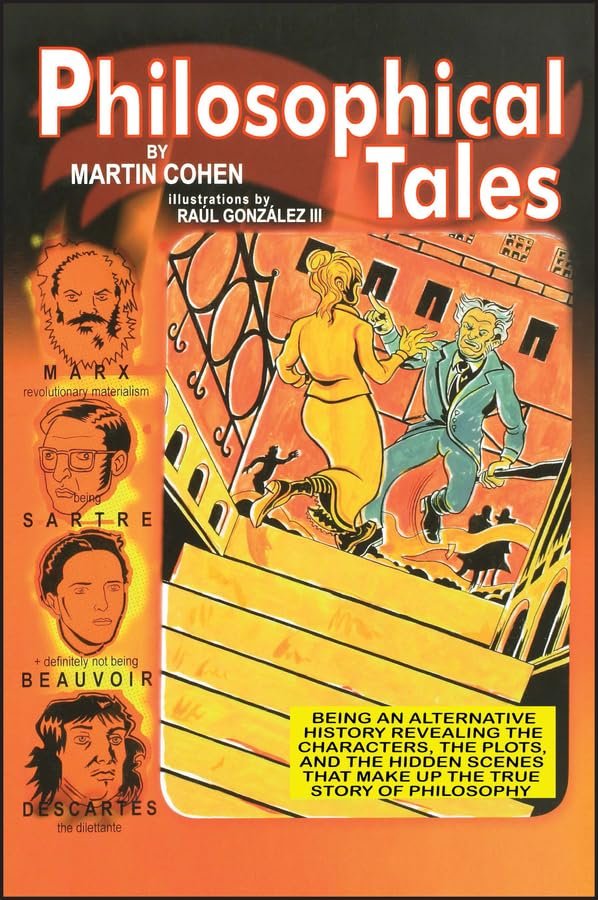- Philosophical Tales: Being an Alternative History Revealing the Characters, the Plots, and the Hidden Scenes That Make Up the True Story of Philosophy

- Author: Martin Cohen
- Illustrator: Raul Gonzalez
- Publisher: Wiley-Blackwell
- Publication Date: May 27, 2008
- Print Length: 304 Pages
- About the Author
Martin Cohen is a journalist, editor, and author specializing in popular books in philosophy, social science, and politics. His books include the bestselling ‘101 Philosophy Problems, ‘Critical Thinking Skills for Dummies’ as well as more social scientific books such as ‘I Think Therefore I Eat’, on food science, and a look at how scientists work called ‘Paradigm Shift’. This sounds rather technical but is actually a great deckchair read, taking a look at many perplexed and perplexing issues in life, from religion to science, from food fads to black holes in space. Another recent book, now issued in paperback, called ‘The Leaders’ Bookshelf’, is all about ideas and inspirations – and how even quite ordinary books can be ‘intuition pumps’ sending their readers off to achieve extraordinary things.
Martin now writes full-time, but in the past has taught philosophy and social science at a number of universities in the UK and Australia, and was involved in a research project exploring ways to shift philosophy teaching away from the the mere study of philosophical facts and toward a view of philosophy as an activity.
An activist environmentalist, he wrote an influential series of articles in the Times Higher (London) about the politics of the climate change debate. He has written discussion papers on environmental concerns for the European Parliament and has been invited by the Chinese government to discuss ecological rights and indigenous communities.
As an editor, his strategy is to allow as wide a range of ideas as possible in a forum and he loves articles by non-specialists with unusual and original ideas. He is currently based in Aquitaine, France, but travels often to the US and UK.
- Reviews
“A lover of philosophical ideas and practiced debunker of intellectual sham, Martin Cohen knocks some thirty important philosophers from Socrates to Derrida off their pedestals and presents in a series of philosophical tales various aspects of their thought, life, and personality which few of us ever suspected.” Zenon Stavrinides, University of Bradford
“Philosophical Tales is highly recommended, not only for debutants but also for the cognoscenti who will find much here both amusing and stimulating.” The Philosopher
“Philosophers, more even than poets and composers, set themselves apart from common humanity to engage in their uncommonly rarefied practices. In the unlikely event of their productions becoming even vaguely well known they shun publicity. Their obituaries and encyclopedic entries condense lifelong achievements into garbled accounts of their philosophies, dates of publication of their more respectable works, and odd biographical details. Fortunately, in Philosophical Tales, Martin Cohen has compiled highly entertaining accounts of all too human aspects of thirty philosophers, presumably the more quirky of the breed. But of course, the whole point of the exercise is a selection of behaviors exponent of, or in marked contrast to, their perpetrators’ stated philosophies. Schopenhauer, an example of the former, and Marx, of the latter, appear prominently on the cover. Raul Gonzalez III’s illustrations complement the text admirably. His Augustine is a masterpiece, suitable for reproduction as a missal bookmark. Philosophical Tales is both readable and enjoyable with the added advantage that potted versions of their philosophies, required to appreciate the relevance of accounts of their misdemeanors, illuminate these thirty philosophers’ works remarkably well. They are longer than encyclopedia entries, shorter than extended essays, and allow a generally rounded account…. Philosophers are frequently pompous, Cohen’s own, tongue-in-cheek, Pompous Footnotes show him consciously capable of the genre but so do several judgments of his with which I totally disagree, such as the one above. However, as the objective of this book is to entertain and stimulate, let no one be in any doubt that it achieves both admirably. An interesting diversion Scholarly Appendix: Women in Philosophy calls Diotima the Mother of Western philosophy, in so far as she taught Socrates, the spokesperson for Plato’s philosophy. Whitehead proved the point with his dictum that Western philosophy is no more than a footnote to Plato. Whether or not Pascal was right in his assertion: To make light of philosophy is to be a true philosopher, levity certainly makes the subject more enjoyable and could well lead to deeper exploration. Therefore, Philosophical Tales is highly recommended, not only for debutants but also for the cognoscenti who will find much here both amusing and stimulating. Great philosophers only become well-known after their deaths. Indeed, to speak of contemporary celebrity philosophers is oxymoronic. Still, one can’t help wondering who amongst living philosophers will merit future Philosophical Tales.” Colin Kirk, The Philosopher Autumn 2008
